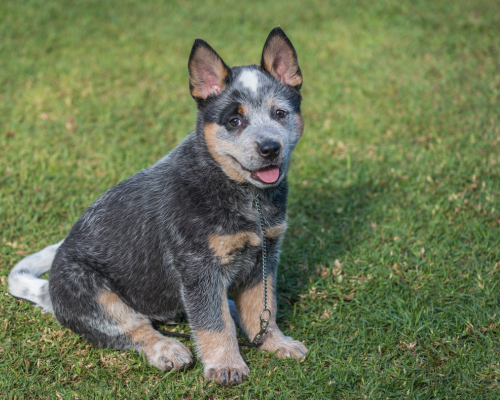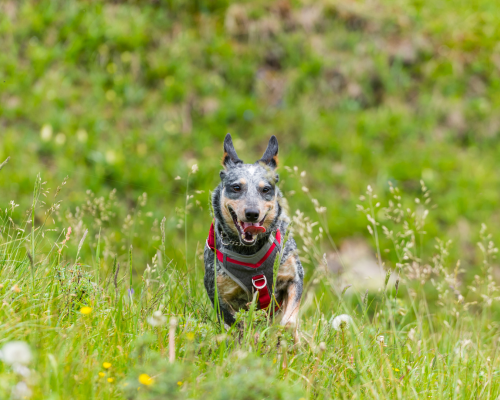Blue Heeler (Cattle Dog) Pros and Cons
Blue Heeler (Cattle Dog) Pros and Cons

Vet Reviewed

By: Sarah Hodgson
November 3, 2023
- Posted in Dogs
Table of Contents
In this post, we'll focus on a special breed the Blue Heeler (Australian Cattle Dog). If you're considering adding a Blue Heeler to your family, this in-depth guide will help you understand the pros and cons of owning this energetic and intelligent breed and whether it's the right fit for you.
Let's dive in!
What Is a Blue Heeler?
To start with let's go over the background of this breed.
The Blue Heeler, also known as the Australian Cattle Dog, is a breed that originated in Australia to handle herds of cattle in rough terrains. These dogs are incredibly hard-working, intelligent, and have a high level of energy that needs proper channeling. They are distinguished by their beautiful blue or red speckled coat which gives them their name. Blue Heelers are medium-sized dogs with athletic bodies, designed for sport.
As part of their herding instincts, Blue Heelers can be quite protective and territorial. They develop strong bonds with their owners and are known for their unwavering loyalty. Their physical and mental agility combined with their loyalty makes them excellent working dogs, participating in police work, search and rescue missions, and as service dogs.

Pros of Owning a Blue Heeler
The Blue Heeler, also known as the Australian Cattle Dog, is a breed that offers numerous advantages to their owners. They are truly an adorable dog breed. We compiled the top advantages below of owning a Blue Heeler.
The Pros Of Blue Heelers:
- Intelligent: Blue Heelers are highly intelligent and can learn commands and tasks quickly.
- Energetic: They are a very active breed, making them great for people who enjoy outdoor activities and exercise.
- Versatile: Blue Heelers can excel in various dog sports and activities, such as agility, herding, and obedience.
- Protective: They are known for their loyalty and can be protective of their owners and property.
- Low grooming needs: Their short coat is easy to maintain and doesn't require excessive grooming.
- Alert: Blue Heelers are known for their alertness, making them excellent watchdogs.
- Good with families: With proper socialization, they can be great family pets, especially with active households.
- Herding instincts: They have strong herding instincts, which can make them excellent working dogs on farms.
- Longevity: Blue Heelers typically have a relatively long lifespan, often living 12-16 years.
- Low health issues: They are generally a healthy breed, with few genetic health problems.
- Affectionate: While they can be protective, Blue Heelers are also affectionate and can form strong bonds with their owners.
- Problem-solving skills: Their intelligence and problem-solving abilities make them an interesting and engaging companion.

Cons of Owning a Blue Heeler
While Blue Heelers have many admirable traits, there are also some challenges associated with owning these dogs. The most significant issues usually arise from their high energy levels, their independence, and their tendency to be somewhat reserved around strangers.
Let's dive into the cons of Blue Heelers
- High energy: Blue Heelers are extremely active and need a lot of exercise and mental stimulation. Failure to provide this can lead to behavioral problems.
- Strong herding instincts: While their herding instincts can be an asset, they may also try to herd people, especially small children, which can be a concern.
- Stubbornness: Blue Heelers can be quite stubborn and may not always obey commands, particularly if they don't see the point in doing so.
- Early socialization needed: Without proper socialization, they can be wary of strangers and may display aggressive behavior.
- Not for apartments: These dogs are not well-suited for apartment living due to their need for space and exercise.
- Barking: Blue Heelers are prone to barking, and excessive barking can be a problem if not properly managed.
- Destructive behavior: If they don't get enough mental and physical stimulation, they may engage in destructive behaviors like chewing or digging.
- Can be aggressive: Without proper training and socialization, Blue Heelers can display aggression towards other animals and even people.
- Strong prey drive: They may have a strong prey drive, making them inclined to chase small animals like cats or squirrels.
- Not ideal for novices: Their high energy levels and strong-willed nature can make them a challenging breed for first-time dog owners.
Understanding the Blue Heeler's Temperament
Now that we have covered the overall pros and cons let's dive into their temparment.
The temperament of a Blue Heeler is pretty much a mix of loyalty, independence, and attentiveness. They are extremely faithful to their owners, and willing to protect them at any cost. However, this devotion can sometimes manifest as possessiveness (Demanding attention).
Blue Heelers are also independent dogs. They are perfectly capable of entertaining themselves and don't require constant attention. However, this independence can sometimes tip into stubbornness.
Finally, Blue Heelers are vigilant dogs. They are always alert and aware of their surroundings, making them excellent watchdogs. However, this vigilance can sometimes lead to overprotectiveness, especially if they are not adequately socialized from a young age.

The Blue Heeler's Health and Maintenance
Blue Heelers are generally healthy dogs, which we mentioned as one of their pros but like any breed, they are prone to specific health conditions.
One of the most common health issues in Blue Heelers is progressive retinal atrophy (PRA), a condition that can lead to blindness. Regular eye exams can help detect this condition early. Hip dysplasia, a common issue in many dog breeds, can also affect Blue Heelers.
In terms of maintenance, Blue Heelers have a dense double coat that requires regular brushing. They are not heavy shedders, but brushing will help keep their coat healthy and minimize shedding. Regular exercise is also a critical part of a Blue Heeler's routine.
Why a Blue Heeler is a Good Choice?
So after discussing all that above, a Blue Heeler can be a wonderful choice for a dog. Their intelligence, energy, and loyalty make them delightful breeds. They are also versatile dogs, adaptable to a variety of living situations.
Note
Potential Blue Heeler owners should be prepared to invest time and effort into their dog's training and exercise. They should also be prepared for a dog that may be reserved around strangers. But for those who can meet these challenges, the rewards of owning a Blue Heeler are immense.
The Bottom Line
So there you have it, while there are both pros and cons to owning a Blue Heeler, the joy they bring to their owners' lives often outweighs any challenges. So if you're ready for the commitment, a Blue Heeler could be a perfect addition to your family.
You won't regret it!
Frequently Asked Questions
Are Blue Heelers good family dogs?
Yes, with proper training and socialization, Blue Heelers can make excellent family dogs. They are known for their loyalty and protective nature, making them great companions.
How much exercise does a Blue Heeler need?
Blue Heelers require significant amounts of exercise. At a minimum, they should get at least one hour of intense activity every day.
Are Blue Heelers aggressive?
No, Blue Heelers are not inherently aggressive. However, if not properly socialized, they can be wary of strangers and may exhibit protective behaviors.

Subscribe to Petfluence!
Get updates on the latest posts and more from Petfluence straight to your inbox.